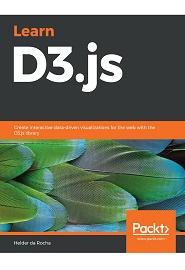
English | 2019 | ISBN: 978-1838645571 | 650 Pages | PDF, EPUB | 186 MB
Explore the power of D3.js 5 and its integration with web technologies for building rich and interactive data visualization solutions
This book is a practical hands-on introduction to D3 (Data-driven Documents): the most popular open-source JavaScript library for creating interactive web-based data visualizations. Based entirely on open web standards, D3 provides an integrated collection of tools for efficiently binding data to graphical elements. If you have basic knowledge of HTML, CSS and JavaScript you can use D3.js to create beautiful interactive web-based data visualizations.
D3 is not a charting library. It doesn’t contain any pre-defined chart types, but can be used to create whatever visual representations of data you can imagine. The goal of this book is to introduce D3 and provide a learning path so that you obtain a solid understanding of its fundamental concepts, learn to use most of its modules and functions, and gain enough experience to create your own D3 visualizations. You will learn how to create bar, line, pie and scatter charts, trees, dendograms, treemaps, circle packs, chord/ribbon diagrams, sankey diagrams, animated network diagrams, and maps using different geographical projections. Fundamental concepts are explained in each chapter and then applied to a larger example in step-by-step tutorials, complete with full code, from hundreds of examples you can download and run.
This book covers D3 version 5 and is based on ES2015 JavaScript.
What you will learn
- Learn to use D3.js version 5 and web standards to create beautiful interactive data-driven visualizations for the web
- Bind data to DOM elements, applying different scales, color schemes and configuring smooth animated transitions for data updates
- Generate data structures and layouts for many popular chart formats
- Apply interactive behaviors to any chart
- Create thematic maps based on GIS data using different geographical projections with interactive behaviors
- Load, parse and transform data from JSON and CSV formats
Resolve the captcha to access the links!